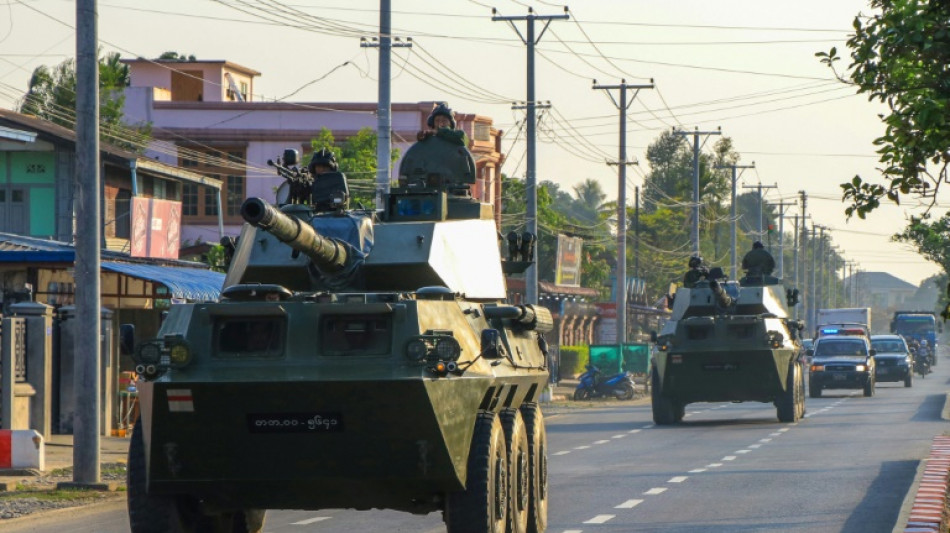
-
 Three talking points ahead of clay-court season
Three talking points ahead of clay-court season
-
French court hands Le Pen five-year election ban

-
 Probe accuses ex J-pop star Nakai of sexual assault
Probe accuses ex J-pop star Nakai of sexual assault
-
Japan leads hefty global stock market losses on tariff woes

-
 Saka 'ready to go' after long injury lay-off: Arteta
Saka 'ready to go' after long injury lay-off: Arteta
-
Ingebrigtsen Sr, on trial for abusing Olympic champion, says he was 'overly protective'

-
 Tourists and locals enjoy 'ephemeral' Tokyo cherry blossoms
Tourists and locals enjoy 'ephemeral' Tokyo cherry blossoms
-
Khamenei warns of 'strong' response if Iran attacked

-
 France fines Apple 150 million euros over privacy feature
France fines Apple 150 million euros over privacy feature
-
UK PM urges nations to smash migrant smuggling gangs 'once and for all'

-
 Thai authorities probe collapse at quake-hit construction site
Thai authorities probe collapse at quake-hit construction site
-
France's Le Pen convicted in fake jobs trial

-
 Chinese tech giant Huawei says profits fell 28% last year
Chinese tech giant Huawei says profits fell 28% last year
-
Trump says confident of TikTok deal before deadline

-
 Myanmar declares week of mourning as hopes fade for quake survivors
Myanmar declares week of mourning as hopes fade for quake survivors
-
Japan's Nikkei leads hefty market losses, gold hits record

-
 Tears in Taiwan for relatives hit by Myanmar quake
Tears in Taiwan for relatives hit by Myanmar quake
-
Venezuela says US revoked transnational oil, gas company licenses

-
 'Devastated': Relatives await news from Bangkok building collapse
'Devastated': Relatives await news from Bangkok building collapse
-
Arsenal, Tottenham to play pre-season North London derby in Hong Kong

-
 Japan's Nikkei leads hefty equity market losses; gold hits record
Japan's Nikkei leads hefty equity market losses; gold hits record
-
Israel's Netanyahu picks new security chief, defying legal challenge

-
 Trump says US tariffs to hit 'all countries'
Trump says US tariffs to hit 'all countries'
-
Prayers and tears for Eid in quake-hit Mandalay

-
 After flops, movie industry targets fresh start at CinemaCon
After flops, movie industry targets fresh start at CinemaCon
-
Tsunoda targets podium finish in Japan after 'unreal' Red Bull move

-
 French chefs await new Michelin guide
French chefs await new Michelin guide
-
UK imposes travel permit on Europeans from Wednesday

-
 At his academy, Romanian legend Hagi shapes future champions
At his academy, Romanian legend Hagi shapes future champions
-
Referee's lunch break saved Miami winner Mensik from early exit

-
 Djokovic refuses to discuss eye ailment after shock Miami loss
Djokovic refuses to discuss eye ailment after shock Miami loss
-
Mitchell magic as Cavs bag 60th win, Pistons and T'Wolves brawl

-
 Mensik shocks Djokovic to win Miami Open
Mensik shocks Djokovic to win Miami Open
-
Duterte lawyer: 'compelling' grounds to throw case out

-
 What happens on Trump's 'Liberation Day' and beyond?
What happens on Trump's 'Liberation Day' and beyond?
-
Clock ticks on Trump's reciprocal tariffs as countries seek reprieve

-
 Japan-Australia flagship hydrogen project stumbles
Japan-Australia flagship hydrogen project stumbles
-
Musk deploys wealth in bid to swing Wisconsin court vote

-
 Mensik upsets Djokovic to win Miami Open
Mensik upsets Djokovic to win Miami Open
-
China manufacturing activity grows at highest rate in a year

-
 'Waited for death': Ex-detainees recount horrors of Sudan's RSF prisons
'Waited for death': Ex-detainees recount horrors of Sudan's RSF prisons
-
Japan's Nikkei leads big losses in Asian markets as gold hits record

-
 Rescue hopes fading three days after deadly Myanmar quake
Rescue hopes fading three days after deadly Myanmar quake
-
'Basketbrawl' as seven ejected in Pistons-Wolves clash

-
 Four men loom large in Microsoft history
Four men loom large in Microsoft history
-
Computer pioneer Microsoft turns 50 in the age of AI

-
 Trump calls out both Putin and Zelensky over ceasefire talks
Trump calls out both Putin and Zelensky over ceasefire talks
-
Kim Hyo-joo tops Vu in playoff to win LPGA Ford Championship

-
 Economy and especially Trump: Canadians' thoughts on campaigns
Economy and especially Trump: Canadians' thoughts on campaigns
-
Liberal PM Carney takes lead four weeks before Canada vote


'Living in a dark era': one year since Myanmar's coup
Hours before Myanmar's new parliament was due to convene last February, troops rounded up lawmakers in dawn raids, ending a brief democratic interlude and setting the stage for months of bloodshed.
A year later the country's latest junta is struggling to contain the backlash unleashed by its power grab, with daily clashes and swathes of the country outside of its control.
Almost 1,500 civilians have been killed and over 11,000 arrested in its ongoing crackdown, according to a local monitor, with rights groups accusing junta troops of torture and extrajudicial killings.
But for a pro-democracy movement angered by the military's power-grab, ending its decades-long entanglement in Myanmar politics once and for all is the only option.
That means, analysts say, there is no end in sight to the crisis that has devastated the economy, emptied schools and hospitals across the country and sent thousands fleeing to neighbouring Thailand and India.
"We are still living in a dark era," said Htoo Aung -- using a pseudonym for fear of reprisal -- at a market in commercial hub Yangon.
"We have to think how we can struggle on through our daily lives under this military dictatorship rather than about our goals, our dreams in the future."
In Yangon and other cities, the junta is projecting a return to normality as traffic jams return and shopping malls slowly fill up again.
But, days before the February 1 anniversary, it is taking no chances.
Authorities recently announced that those honking car horns or banging pots and pans -- popular protests in cities following the coup -- could be charged with treason or under an anti-terror law.
But daily clashes between the dozens of "people's defence forces" (PDFs) that have sprung up across the country to fight back against the putsch show no sign of abating.
The ex-protesters and villagers that fill their ranks have dealt some painful blows to junta troops with guerilla ambushes and mine attacks, even as they struggle to secure heavy weapons.
A shadow group of lawmakers claims almost 3,000 junta troops died in fighting with PDFs between June and November -- the junta says 168 soldiers and police were killed between February and late October.
- Air strikes -
The year of conflict has taken a toll on the military, which is facing morale and recruitment problems, said International Crisis Group's Myanmar senior advisor Richard Horsey.
"But these challenges are very unlikely to force the military to capitulate or lose its grip on state power," Horsey said.
Junta troops were blamed for a Christmas Eve massacre that left the charred remains of more than 30 people on a highway in the east of the country, including two staff members of the Save the Children charity.
Earlier in January it ordered air and artillery strikes on a state capital in the east to prevent anti-coup fights from seizing ground in the town.
Myanmar's myriad ethnic armed groups have largely held back from throwing their lot in with the democracy movement thanks to a longstanding mistrust of the majority Bamar elite -- epitomised by Aung San Suu Kyi and her ousted National League for Democracy.
It is a trust deficit that a shadow "National Unity Government" dominated by lawmakers from her party, and which has widespread support, is trying to overcome.
Suu Kyi's closed-door trial in the military-built capital continues, and in the coming months she will likely be sentenced on a clutch of corruption charges -- each of which carries a maximum 15-year jail term.
- 'Knockout blow' -
With the generals shielded at the United Nations by China and Russia -- and the crisis jostling for attention with wars in Ethiopia, Yemen and Ukraine -- many in Myanmar have given up on help arriving from the international community.
The military is killing protesters almost daily "without the world noticing," said Htoo Aung.
The generals have promised a return to multiparty democracy and fresh elections by 2023.
But "it is impossible to see how they could do so given their tenuous control of much of the country," said the Crisis Group's Horsey.
It seems "very unlikely that either side will be able to deliver a knockout blow", he said.
"The stage is set for months, possibly years of violent confrontation."
L.Harper--AMWN